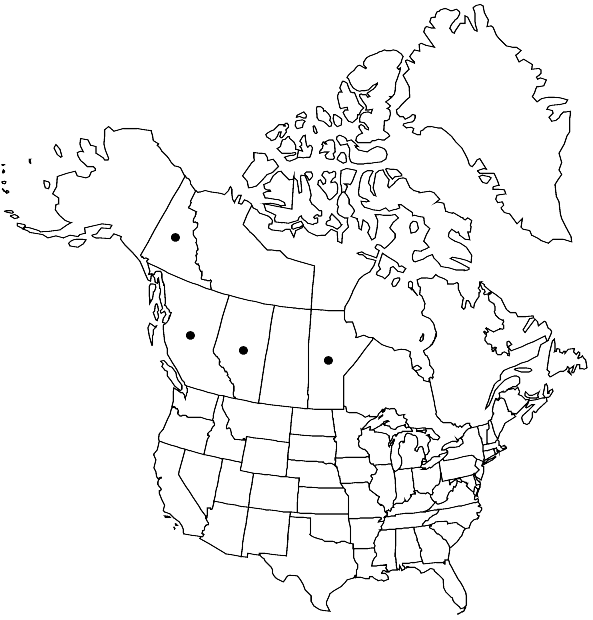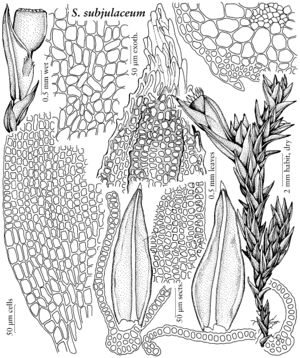Schistidium subjulaceum
Bryophyt. Biblioth. 49: 161, fig. 61. 1996,.
Plants in open to somewhat compact tufts, olivaceous, brownish, or nearly black. Stems 1.3–2(–3) cm, central strand distinct. Leaves erect or curved, sometimes curved towards stem, imbricate, sometimes weakly spreading when dry, ovate-triangular to ovate-lanceolate, keeled distally, 1.2–1.8(–2.2) mm, 1-stratose, rarely with 2-stratose striae or patches distally; margins usually recurved to near apex, smooth or rarely weakly denticulate distally, 2-stratose, occasionally 3-stratose, often in more than one row; apices acute or somewhat rounded; costa sub-percurrent, percurrent, or excurrent as a short, denticulate, slightly decurrent awn, abaxial surface occasionally weakly papillose; basal marginal cells quadrate or short-rectangular; distal laminal cells mostly isodiametric or ovate, occasionally short-rectangular, 9–13 µm wide, smooth, weakly sinuose, walls usually pale orange or yellowish. Sexual condition autoicous. Capsule light (yellow-) brown, occasionally red-brown, short-cylindric or ovoid, usually narrowed towards the mouth, 0.8–1.4(–1.7) mm; exothecial cells mostly irregularly angular, short-elongate or isodiametric, rarely oblate, walls thin or moderately and unevenly thickened, often somewhat curved, trigonous; stomata present; peristome patent to squarrose-recurved, often twisted, 300–450 µm, dull dark red or brown, densely papillose, usually entire, sometimes weakly perforated. Spores 11–18 µm, granulose or verruculose.
Phenology: Capsules mature late spring to early summer.
Habitat: Wet to dry rocks in or along water courses or in periodically wet sites such as in crevices or on ledges, rarely on rocks well away from wet areas
Elevation: moderate to high elevations (1000-1600 m)
Distribution

Alta., B.C., Man., Yukon, Eurasia.
Discussion
Schistidium subjulaceum appears closely related to S. rivulare. Its smaller, more compact stature, and the consistently larger, often lighter colored capsules that are usually slightly narrowed towards the mouth separate it from S. rivulare.
Selected References
None.
